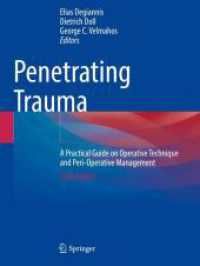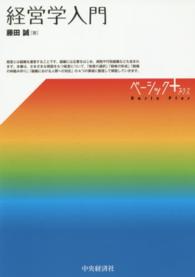- ホーム
- > 洋書
- > 英文書
- > Literature / Classics
Full Description
The original essays in Oxford Twenty-First Century Approaches to Literature mean to provoke rather than reassure, to challenge rather than codify. Instead of summarizing existing knowledge, scholars working in the field aim at opening fresh discussion; instead of emphasizing settled consensus they direct their readers to areas of enlivened and unresolved debate.
Booksellers, authors, and academics have been talking about world literature since Goethe made the term fashionable in the early nineteenth century. Yet amidst all the talk of books that 'circulate' and literature as a kind of universal property that can function as a 'window on the world', how do we account for the people who live in real places, and who write, translate, market, and read the texts that travel on these global journeys? World Authorship breaks new ground by showing how to bring together the real-world contexts of authorship with the literary worlds of fiction.
Written by world-leading academics and creative professionals including authors, translators, publishers, editors, prize jurors, and literary festival organizers, World Authorship updates Michael Foucault's 'author function' by significantly expanding the network of people and practices involved in literature. It covers keyword aspects of world authorship, grounding them in the study of actual literary texts to illuminate how literature is shared and made in different parts of the world and at different times in history. At the heart of all contributions, however, is one key question: where is the human element in world literature? By covering everything from 'Beginnings' to 'Voice', World Authorship provides the answer.
Contents
1: Rebecca Braun: Introduction
2: Alexander Beecroft: Beginnings: A World History of Authorship
3: Rebecca Braun: Celebrity: On the Different Publics of World Authorship
4: Alexandra Harrington: Censorship: The Challenge of Writing in Oppressive Regimes
5: Sondra Bacharach: Collaboration: Re-thinking Origins and Ownership
6: Ra Page: Commissions: The Politics of Origin and Market
7: Beverley Nambozo Nsengiyunva: Communities: Forging the Voices of Poets in Africa
8: Benoît Peeters: Death: On Barthes's Images of Authorship without Authority
9: Daniel Punday: Digital Writing: Authorship and Platform
10: Benedict Schofield: Engagement: Authoring European Futures
11: Gisèle Sapiro: Festivals: Constructing an Alternative Public Sphere
12: Michel Hockx: Independence: Online Experimental Fiction in China
13: Nathalie Carré: Language: Digital Technologies Diversifying World Authorship
14: César Domínguez: Law: Making Authorial Personhood for the World
15: Chidi Ukwu: Media: Channels for New Kinds of Authorship in Africa
16: Tobias Boes: Nation: Authors as Exemplars of Political Communities
17: Luis Bravo: Networks: Poetry, Festivals, and Information Technology in Latin America, 1993-2017
18: Emily Spiers: Performance: Worlding Literature through Spoken-Word Poetry
19: Susan Bassnett: Popularity: Authorship and Audiences over Time
20: Daniel Hahn: Prizes: A Personal View of the UK Awards Industry Today
21: Zahid Hussain: Readers: The Space Between Us All
22: Sridhar Aghalaya in conversation with Emily Spiers: Representation: The Role of the Literary Agent in India
23: Jeffrey R. Di Leo: Self-Publishing: Transforming Ways of Writing and Reading
24: Karen Leeder: Translation: Michael Krüger and Paul Muldoon in Conversation
25: George Green and Graham Mort: Universities: Creating Authors through Higher Education
26: Ulrike Almut Sandig: Voice: I am My Own Song From Offstage








